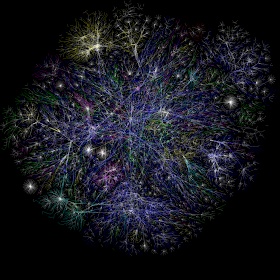SCIENCE JOURNALIST - WRITER - SPEAKER @ ClearScience42 ***** Specialized in artificial intelligence, robots, the brain and Alan Turing***Gespecialiseerd in kunstmatige intelligentie, robots, het brein en Alan Turing.
Sunday, January 6, 2013
The Internet turns 30 - Happy birthday!
A brief history of the Internet
1969 The first version of the ARPANET, developed by the United States Department of Defense. The ARPANET is the predecessor of our present day Internet.
1971 Ray Tomlinson sends the world's first e-mail between two computers of the ARPANET. He is the first to use the @-sign in an e-mail address.
1983 DARPA (America's Defense Advanced Research Projects Agency) adopts the Transmission Control Protocol/Internet Protocol (TCP/IP) as the standard protocol for communication between computers. The Internet is born on January 1, 1983. It consists of a network of 500 computers at universities and US government institutions.
1990 Birth of the World Wide Web at the CERN-institute in Geneva (Switzerland). The whole world should thank Tim Berners-Lee that his invention was not patented and commercialized, but stayed an open, free infrastructure. Wouldn't he deserve the Nobel Peace Prize for this?
Note: Many people confuse the Internet with the World Wide Web. They are not the same. The Internet is the infrastructure underlying the World Wide Web, like motorways are the underlying structure for cars, motorcycles and trucks. The Internet is a network of computer networks. WWW is one of the services that runs on the Internet, but there are more services, such as e-mail, FTP, VoIP and Usenet.
1991 Info.cern.ch is the first website, running on a NeXT-computer at CERN
1992 Website-registration for the Internet begins with domain names ending on .com, .net, .org, .gov and .edu.
1993 CERN opens up the World Wide Web for everyone.
1994 Release of the Netscape Navigator, a browser for the Internet. Creation of JAVA.
1995 Foundation of Yahoo, Amazon.com and eBay.
1996 Launch of Hotmail
1997 The Amsterdam Internet Exchange is launched. Amsterdam becomes the Internet capital of the world.
1998 Google founded
2000 Burst of Dot.com-bubble
2001 Launch of Wikipedia
2003 Launch of Second Life
2004 Launch of Facebook
2005 Launch of YouTube and Google Earth
2006 Launch of Twitter
2006 Web Science becomes the scientific study of the Web
2011 Although it is really too much honor to call the Arab Spring a Facebook- or a Twitter-revolution, Facebook and Twitter definitely play an accelerating role in spreading the revolutionary spirit during the Arab Spring.
2013 Internet @30...More than 2,4 billion people worldwide use the Internet. If the Internet were a country, it would rank as the world's fifth-largest economy.
To-Do-list for the next 30 years:
- One-third of the world population has now access to Internet. But that also means that two-third of the world population has no access. The next challenge is to connect all world citizens.
- Our present Internet connects computers and people. The next step will be to also connect THINGS: your car, your fridge, your house. As more and more things are getting sensors and chips, they can be connected to the Internet
- Turning the Internet in a true and beneficial Social Machine that uses Big Data. Read my interview with Dame Wendy Hall about the Social Machine.
- Interplanetary Internet
More about the Internet on the Internet:
Read here more about the history of the Internet.
Visit also the The Big Internet Museum
Internet World Stats collects statistics about the use of Internet in the world
